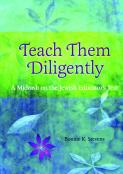- Home
- Play & Learn Home
- Online Enrichment
- Experience Modern Israel
- Israel It's Complicated
- Jewish and Me
- Jewish Holidays Jewish Values
- Jewish Values in Genesis and Jewish Values in Exodus
- Min Ha’aretz
- Our Place in the Universe
- Simply Seder
- The Prophets: Speaking Out for Justice
- Making T'filah Meaningful
- Make, Create, Celebrate
- Yom Haatzmaut Resources
- Hebrew Apps
- About The OLC
- What is the OLC?
- Introduction
- Get Started
- Resources
- OLC Content
- Parent Materials
- See My OLC Classes
- Store
Simchat Torah Reminds Us to Rejoice in Our Roles as Educators
Written by Behrman House Staff, 24 of September, 2013Anna Salomon of Temple Beth-El in St. Petersburg FL Wins First Scholarship to Jewish Coaching Academy
Your Students are Back! Engage Them with New Modules and More Free Resources from Babaganewz
Behrman House marks the beginning of a new year by saluting Jewish educators with this excerpt from Teach Them Diligently: A Midrash on the Jewish Educator's Year, by Bonnie K. Stevens
If any holiday can be singled out as the one that best defines the Jewish teacher’s work and purpose, perhaps it is Simchat Torah. Its themes and symbols embody, precisely and beautifully, what we do.
Simchat Torah reminds us to rejoice in our work. The study of Judaism, and the teaching of Judaism, are indeed obligations, but they’re ones we embrace lovingly and gratefully. As we dance about the sanctuary, we wait eagerly for the moment when the Torah is passed to us; when we feel that familiar weight in our arms, we know we’ve been entrusted not with a burden, but with a treasure, and our hearts thrill to the honor given us. We rejoice in our turn to lead the congregation in following the Torah; we rejoice in the privilege of passing the Torah to the next leader.
When we return to our classrooms in September, we feel that same thrill. Once again, the congregation has entrusted its greatest treasures to us. And despite all the difficulties, all the frustration, we know our students are indeed treasures, not burdens. In our bitterest moments we may complain that some parents see us as babysitters, but we never see ourselves that way. We know much more goes on in our classrooms. We know we’re holding the Torah up for our students, teaching them to recognize how precious it is, preparing them for the day when they’ll take it in their own arms, press it to their own hearts, and lead others in the never-ending renewal of the Jewish people. We are teaching the next teachers. Despite all the difficulties, all the frustrations, we rejoice in the task.
And Simchat Torah teaches us vital lessons about the nature of our joy. These days, we hear much about the yearning for spirituality, about the need for emotional and experiential dimension to religion. Simchat Torah reminds us of the true foundation of spirituality. On Simchat Torah, we dance, yes, and we sing. And we also read. We read a double portion of the Torah, and THAT is the basis for our joy. Simchat Torah tells us spirituality is grounded in more than a vague desire to feel good or connected; rather spirituality is grounded in study, in careful attention to the words of our sacred texts.
On Simchat Torah and in our classrooms, intellect and emotion come together, each fueling and supporting the other. Our study leads us to rejoice; our joy compels us to study. Which is more important—the joy or the study? Simchat Torah reminds us that both are part of an eternal cycle. As teachers, we help that cycle endure.
Simchat Torah also reminds us that Jewish education never ends—not for our students, not for us. We’ve heard the speeches at b’nai mitzvah services and at confirmation ceremonies; we’ve probably made such speeches ourselves. This is not an end, we say, but a beginning; and when we say this, we speak the truth. The end of each stage in Jewish education is the beginning of the next. What holiday embodies that truth more explicitly than Simchat Torah? We end the reading of the Torah be retelling the death of our greatest prophet. Then we immediately begin again, with the birth of a fresh, new world. The words of the text and the ritual of the holiday lead us to the same truth—every end is a new beginning.
As Jewish teachers, we are living symbols of that truth. We end one school year only to begin another. Through our example, we prove to our students that Jewish education never ends. Year after year, we return to our classrooms. We return to our people’s texts, and with our students, study them once again, knowing that this study can never truly be complete—that each year, we become partners in the process of creating new life. This is our obligation, our sacred privilege, our unending joy.


